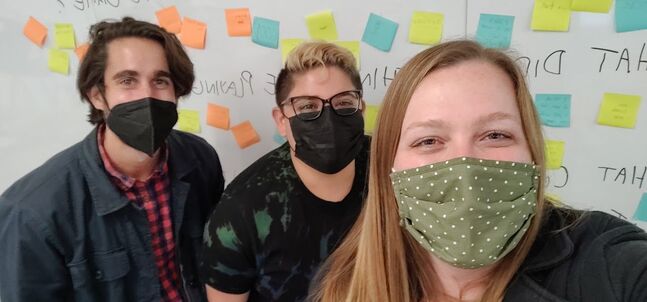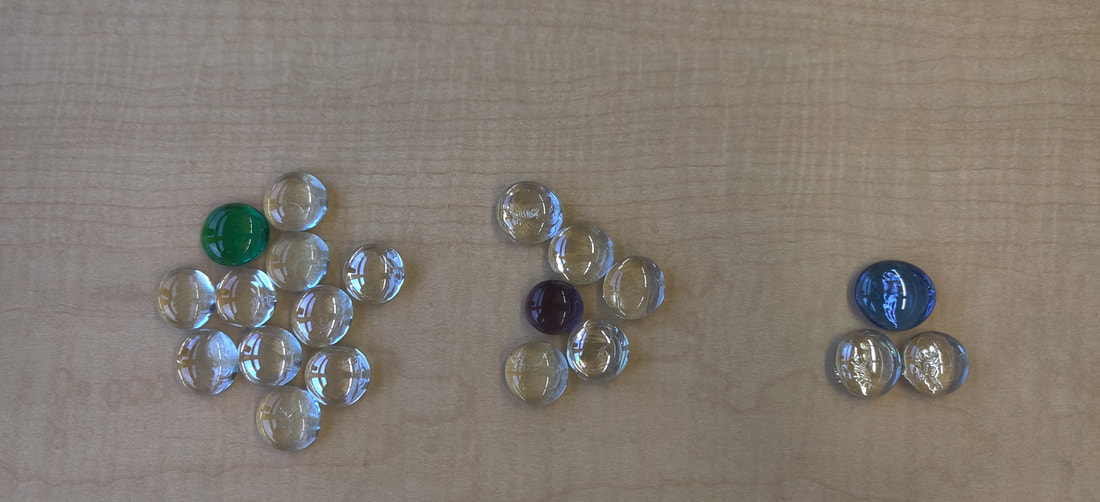Gemstones for Justice

Research Team:
(from left to right)
Sam Pawilkowsky: Researcher and Lesson Study planner + co-facilitator
Adriana Ponce: Researcher, Lesson Study planner, Host Teacher + Co-Facilitator
Kelsey Seal: Researcher and Lesson Study planner + co-facilitator
(from left to right)
Sam Pawilkowsky: Researcher and Lesson Study planner + co-facilitator
Adriana Ponce: Researcher, Lesson Study planner, Host Teacher + Co-Facilitator
Kelsey Seal: Researcher and Lesson Study planner + co-facilitator
Lesson Study Breakdown
Lesson Study
|
Lesson Study
|
Content understanding Goal:
Students will be able utilize personal experience to convey experiences through descriptive details and precise words and phrases.
CCSS.ELA-LITERACY.W.7.3.D
CCSS.ELA-LITERACY.W.7.4
Students will be able utilize personal experience to convey experiences through descriptive details and precise words and phrases.
CCSS.ELA-LITERACY.W.7.3.D
CCSS.ELA-LITERACY.W.7.4
The Research:
To guide our thinking around lesson studies, we read the work of Lewis C. to understand the impact that lesson studies can have on our teaching. So we began our work towards creating a lesson study by getting into groups with other people who had similar questions around what classroom challenges were creating opportunities for learning growth. As we learned of one another's classroom challenges, we joined groups and gathered on the common theme of wanting to create a writing lesson study. Our lesson study we began our understanding of good teaching through the work of Haberman who shared that education needs to be steered away from explicitly banking models of teaching and towards the ideas of students answering critical questions and being more fully engaged in their learning by taking an active role in it. As we began to unpack further the ideas of how to unravel a good lesson, we wanted to give students a uniform experience, while simultaneously creating a low-stakes writing assignment. We found that in the study by Jones and Rice, that lesson studies could be highly successful around writing if they involved students engaging with topics that the could bring their personal experiences into and were also able to incorporate the use of technology as a tool for sharing their written work. In the study they found that writing on the computer helped students feel more confident in getting their ideas down in a quicker and more efficient manner. As a result we implemented the use of technology in the students experience of writing, and we also engaged students in prompts that related directly to their experience of playing the game and also the knowledge that they already possessed before playing the game, by asking students to make connections between the game and real life. In addition to the work by Jones and Rice, we also found the work of Yost, D. To be incredibly helpful in guiding us in ways to unpack a lesson with students by having guided discussions where students could share freely about their experiences as a way to preface the writing that we would ask them to do. We found this particularly useful because it allowed us to envision a lesson study were we could have a natural flow from simulation, to discussion to focused writing time.
To guide our thinking around lesson studies, we read the work of Lewis C. to understand the impact that lesson studies can have on our teaching. So we began our work towards creating a lesson study by getting into groups with other people who had similar questions around what classroom challenges were creating opportunities for learning growth. As we learned of one another's classroom challenges, we joined groups and gathered on the common theme of wanting to create a writing lesson study. Our lesson study we began our understanding of good teaching through the work of Haberman who shared that education needs to be steered away from explicitly banking models of teaching and towards the ideas of students answering critical questions and being more fully engaged in their learning by taking an active role in it. As we began to unpack further the ideas of how to unravel a good lesson, we wanted to give students a uniform experience, while simultaneously creating a low-stakes writing assignment. We found that in the study by Jones and Rice, that lesson studies could be highly successful around writing if they involved students engaging with topics that the could bring their personal experiences into and were also able to incorporate the use of technology as a tool for sharing their written work. In the study they found that writing on the computer helped students feel more confident in getting their ideas down in a quicker and more efficient manner. As a result we implemented the use of technology in the students experience of writing, and we also engaged students in prompts that related directly to their experience of playing the game and also the knowledge that they already possessed before playing the game, by asking students to make connections between the game and real life. In addition to the work by Jones and Rice, we also found the work of Yost, D. To be incredibly helpful in guiding us in ways to unpack a lesson with students by having guided discussions where students could share freely about their experiences as a way to preface the writing that we would ask them to do. We found this particularly useful because it allowed us to envision a lesson study were we could have a natural flow from simulation, to discussion to focused writing time.
The Role of Equity:
|
Equity Goal:
How do we motivate students to use their agency and to provide depth, and elaboration into their writing? We will empower students through low stakes circumstances that will destigmatize them from the fear of being wrong, present in their current perception of writing. |
Rationale:
Our team noticed that students had trouble with engaging with writing in meaningful ways. Phrases like "I don't know what else to write?" or "Am I done yet?" were common themes in our experiences of working with middle school students. We wanted to find a way to allow for students to engage in meaningful writing, without feeling the stress to have the mechanics of writing deter our students from engaging with their writing in meaningful ways. |
|
Playing the Game
In the process of playing the game, students used their social skills and enjoyed a game-ified experience that built on their critical thinking. In order to reflect on what the students played they had to understand fairness and unfairness and grapple with the concept of justice on a larger scale. As the students began the game, they became acutely aware of the ways in which inequity was built into their experience. They had their trading capacities limited by their designated color. They were also restricted in movement and people with whom to initiate a game with. |
Student Reflection
Upon finishing the game, students were able to reflect on their experiences on the back wall of the classroom. They were asked to share thoughtful ideas of how the game was played. Many students were able to make the connection on their own that the game related to privileges around the idea of race based on the colors of the gemstone. Some students even tied the currency to the economic privilege associated with race and the capacity to travel or move with economic freedom.
|
Growing in Practice
Growing in Practice
This lesson study taught me a lot about the power of experience. As students grappled with the unfairness of the game, it gave them the low stakes chance to understand the arbitrariness of privilege that is historically and presently pervasive in our culture. One thing that I continue to grapple with as a project based learning teacher is often the idea that in order to give students agency, agency is immediately seen as giving students many choices in how to do this work. One deep learning experience for me was the fact that when we gave students either the option to write a letter to the game creators, or to write a creative story that would share their experience, this was not necessarily creating agency for them. I learned that it is a disservice for students to have too many choices without having the resource of time to truly unpack the execution of their writing in meaningful and genuine ways. From our research, I learned that my perception of agency can also be achieved through careful and meaningful scaffolding that leads to crafting one tool, such as a letter to a game designer, in order to share in meaningful and purposeful ways the thoughts, opinions and voices of students. Agency can be the cultivation of a new skill that can be executed with purpose and meaning, and that can also be returned to in other moments where a student might need to express when and where they experience injustice. |
Linering Questions:
Lingering Questions: 1. How can we continue to ask students to engage in written work, but still have it be student led rather than incentivized by the teacher? In our group reflection, all of us felt strongly that agency for students to choose what format in which to write, was important. However, I think it would have been really great to see what students would have written outside of a context where they are given just two options to choose from by a teacher. In my wonderings I think about if or how there could have been more student agency in figuring out how to convey experience through writing in a ways that they would easily or even immediately preferred. 2. How could we have used the writing sample to even further the idea of sharing voice and making space for inclusivity? In retrospect, our group found that it was great to have students reflect aloud during class discussions, and we also felt like there were plenty of students who didn't share their thoughts and experiences aloud with the class. The wondering here is how could we have gone deeper in our lesson creation to allow for student voice to really come out in all scaffolded moments of our work together? I would have liked to see students sharing in ways that it was perhaps absent in either the reflection or the class group discussion? |

